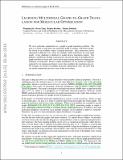Learning multimodal graph-to-graph translation for molecular optimization
Author(s)
Jin, W; Yang, K; Barzilay, R; Jaakkola, T
DownloadAccepted version (1.420Mb)
Open Access Policy
Open Access Policy
Creative Commons Attribution-Noncommercial-Share Alike
Terms of use
Metadata
Show full item recordAbstract
© 7th International Conference on Learning Representations, ICLR 2019. All Rights Reserved. We view molecular optimization as a graph-to-graph translation problem. The goal is to learn to map from one molecular graph to another with better properties based on an available corpus of paired molecules. Since molecules can be optimized in different ways, there are multiple viable translations for each input graph. A key challenge is therefore to model diverse translation outputs. Our primary contributions include a junction tree encoder-decoder for learning diverse graph translations along with a novel adversarial training method for aligning distributions of molecules. Diverse output distributions in our model are explicitly realized by low-dimensional latent vectors that modulate the translation process. We evaluate our model on multiple molecular optimization tasks and show that our model outperforms previous state-of-the-art baselines.
Date issued
2019-01Department
Massachusetts Institute of Technology. Computer Science and Artificial Intelligence LaboratoryJournal
7th International Conference on Learning Representations, ICLR 2019
Citation
Jin, W, Yang, K, Barzilay, R and Jaakkola, T. 2019. "Learning multimodal graph-to-graph translation for molecular optimization." 7th International Conference on Learning Representations, ICLR 2019.
Version: Author's final manuscript